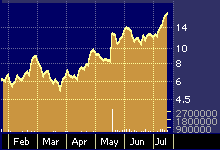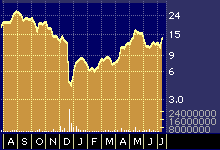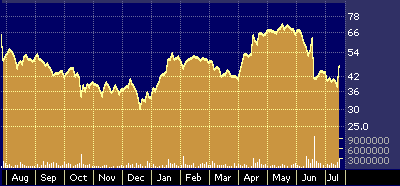
Symantec Finds Favor Among Analysts
Symantec Finds Favor Among Analysts
By Hal Plotkin
Silicon Valley Correspondent
Software security maker Symantec’s stock may have been poised for a rally even before this month’s virus scare. But fears of the “I Love You” virus should kick start Symantec ahead of the rest of the slowing tech sector, analysts say.
To begin with, Cupertino, Calif.-based Symantec Corp. {SYMC} sells three of the five best-selling packaged PC system utilities, Norton Anti-Virus, Norton SystemWorks, and Norton Internet Security, according to market research firm PC Data, based in Reston, Va..
And Symantec is currently the leader in the consumer anti-virus market, selling 99,103 copies of its Norton Anti-Virus product during April compared with 48,043 for rival McAfee.com Corp. {MCAF}.
Add to those facts that Symantec has made progress cracking the corporate security and content management markets. Now, some analysts are looking at Symantec as a keeper, beyond any knee-jerk reactions to the Love Bug virus.

McAfee stock performance

Network Associates stock performance
In an interview broadcast on CNBC on Monday, Courtney Smith, president of Courtney Smith & Company, reiterated his buy recommendation on Symantec during a previous CNBC appearance on March 29 despite the fact it has fallen roughly 15 percent over the past month.
Smith called Symantec’s stock cheap at its current price and said he expects to see the company’s earnings double over the next two years.

Symantec 52-week stock performance
Rob Owens, an analyst at Pacific Crest Securities, based in Portland, Oregon, agrees.
He has a “strong buy” recommendation on the stock and an $80 near-term, six-month price target.
“We think it could push a lot higher than that,” he says. “Viruses are very good for business. We’re seeing the anti-virus business picking up from week to week.”
Kevin Wagner, an analyst at Adams, Harkness & Hill, based in Boston, says sales generated by the “I Love You” virus should offset some of the usual seasonal weakness in Symantec’s retail sales over the April to June period, which is yet to be reported.
“The I Love You virus really underscored the need for a solution,” he says.
Wagner places even greater hopes, though, on Symantec’s recent progress cracking corporate security and content management markets.
Symantec generated roughly 42 percent of sales from corporate customers during the most recent quarter. Wagner sees that number going up to around 55 percent by the end of the current fiscal year.
Recently, the firm has made several acquisitions targeted at opening up additional opportunities in the more lucrative corporate market.
In March, for example, Symantec completed the acquisition of L-3 Network Security, a majority owned subsidiary of L-3 Communications Holdings Inc. {LLL}, for a one-time cash payment of $20 million.
The firm specializes in network security and intrusion detection, two critical and fast-growing corporate security needs. Symantec has also invested heavily in recent months to buy technologies that beef up its online user management and content-filtering product offerings.
“The corporate market is something they’re going after very aggressively,” says Wagner, of Adams, Harkness & Hill. “They’re making a successful transition from being a retail vendor to being an enterprise vendor with a leading retail presence.”
Wagner has had a “strong buy” rating on the stock since early 1999 when it was trading in the mid-twenty dollar range. He currently has an $87 12-month price target based on 30 times his projected calendar 2001 earnings of $2.90 a share.
“We expect to see a lot of growth in demand,” he says.
Analysts note that Symantec is also benefiting from persistent reports from end-users and trade journals alike that its packaged Norton software is more reliable and easier to install and update than competing products from Network Associate’s McAfee.com.
Last year, Windows Magazine announced that Symantec’s Norton SystemWorks product had bested Network Associates’ McAfee Office in a head-to-head comparison.
“We placed Norton SystemWorks on our WinList because it worked more consistently, showed more stability in our tests, and offered better crash protection than McAfee Office,” reviewer Warren Ernst wrote in explaining the results.
Analysts say McAfee.com is making progress in the reliability area, mostly by moving its anti-virus product to a web-based platform that requires the installation of less software on each end-user computer.
But they also say the company’s problems with reliability and features could come back to haunt it as it tries to make additional deals with aggravated personal computer makers who field calls whenever software installed on their customer’s computers doesn’t work properly.
“The PC vendors are pretty annoyed with all those calls, which are expensive, so they may be looking for another partner,” says Abner Germanow, research manager for Internet security at International Data Corporation, based in Framingham, Mass.
Germanow says the outcome of the fight for dominance in the consumer anti-virus market probably won’t be clear for at least another 12 months or so as McAfee.com reworks Network Associate’s problematic packaged software into a more user-friendly, web-based approach.
“The tell-tale sign will show up when we see if McAfee.com can continue their early growth online,” he says.
Meanwhile, Symantec, which typically wins raves for the easy-to use features of its packaged software, continues to gain momentum.
In May, for example, the firm won a big endorsement from Yahoo!, which announced it will be using Symantec’s anti-virus filtering technology to scan all attachments sent or received by users of its free e-mail service, which currently number in the millions.
“The Yahoo! deal is excellent for Symantec,” says Wagner. “It has great marketing legs, its clearly an excellent PR coup for them and should mean added value down the line.”


